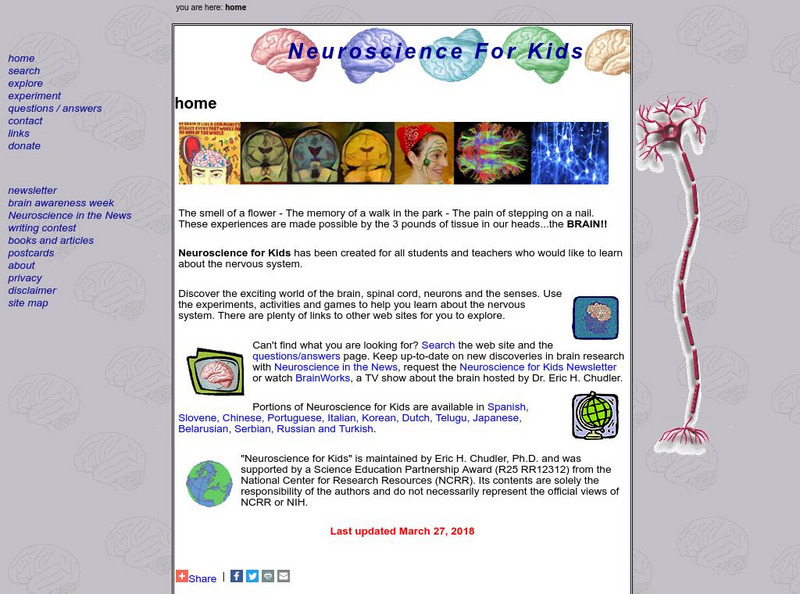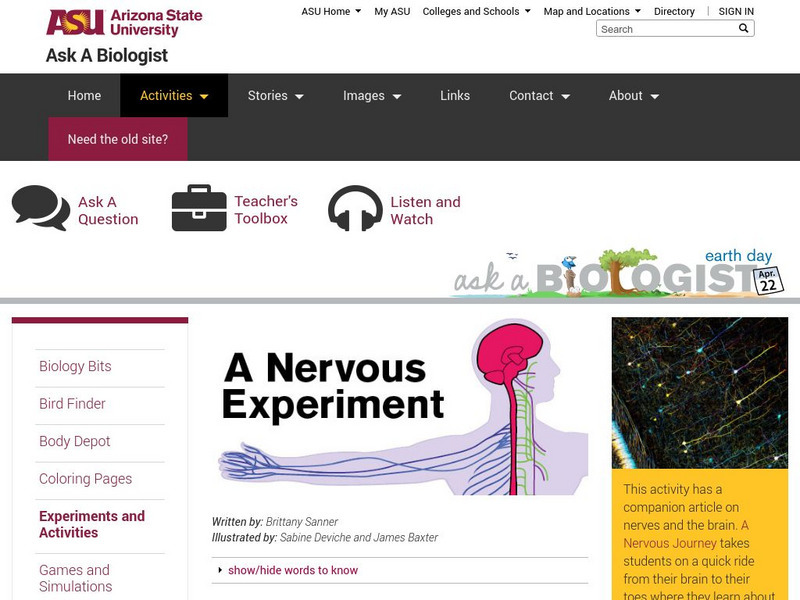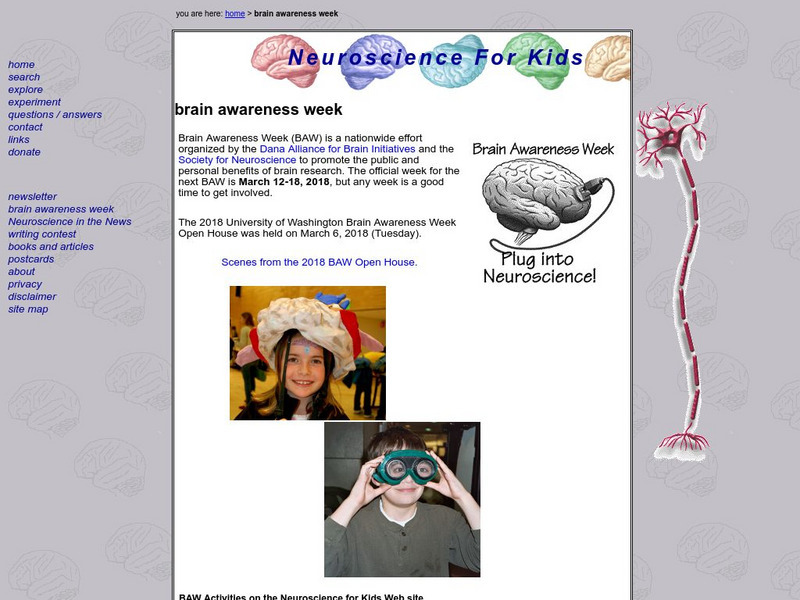Hi, what do you want to do?
Curated OER
Are You Being Poisoned by Your Dishes?
Learners explore lead poisoning and how it relates to ceramic dishes. They perform an experiment to discover if any of your ceramic ware is leaching lead which might cause lead poisoning.
Curated OER
Exploring Muscle Action in the Human Body
Students collect and graph data and use the internet to research the skeletal muscles.
Curated OER
Inside the Cranium: Neuropsychiatric Disorders
Students analyze different regions of the brain which are responsible for different aspects of cognition, awareness and regulating the body's process.
Curated OER
Huntington's Disease
Students research specific genetic disorders and create a pedigree of a fictitious local family in which Huntington's Disease is found. They predict inheritance and severity of HD and role play decision making process involving genetic...
Curated OER
How We Learn About the Brain: Teaching the Infant Brain
High schoolers describe the development of an infant from conception to birth. In this biology instructional activity, students discover how a child's brain develop. They explain how children acquire motor and cognitive skills.
Curated OER
Emotion
In this psychology worksheet, students complete 5 short answer questions on neural pathways of emotion. They explain what aspect of emotion is similar across all cultures.
Curated OER
Show 303: New Research into Dyslexia
Students explore the causes of dyslexia. They view CT sans and MRIs to view the brain and how it responds. Students read reports about dyslexia. They discuss the nature of dyslexia, its cause, how to diagnose it, and its permanency.
Curated OER
Hold Off on the Headphones
Students determine that waves carry energy and information from one place to another. They determine that wavelength, frequency and wave speed are related and describe that sound is a longitudinal wave whose speed depends on the...
Curated OER
Left and Right Brains
Students research the part of the brain known as the corpus callosum. The part of the brain that connects the left and right brain, students investigate its functions and how data passes from one side to another.
Curated OER
Hold Off on the Headphones
Learners explore hearing loss caused by sound waves. In this physical science lesson plan, students will start by learning about waves and wave characteristics and move into sound waves. Learners will study how sound effects their...
Curated OER
Alcohol and Pregnancy Don't Mix!
Seventh graders learn about John Kellerman, a youngster who was born with Fetal Alcohol Syndrome. They learn how alcohol and pregnancy doesn't mix.
Curated OER
Embryological Development Using Medaka Fish
Students analyze and record major events that occur in the development of Medaka fish eggs from fertilization to hatching. In small group, students describe the processes involved, creating a timeline of the major events in the...
Curated OER
Teaching Awareness of Human Development
Students examine the process of human development and identify the reasons for a good nights sleep. Individually, they write a list of the situations in their lives which are stressful. As a class, they discuss myths about stress and...
TeachEngineering
Teach Engineering: A Tasty Experiment
Students conduct an experiment to determine whether or not the sense of smell is important to being able to recognize foods by taste. They do this by attempting to identify several different foods that have similar textures. For some of...
Howard Hughes Medical Institute
Hhmi: Biointeractive: The Virtual Neurophysiology Lab
Investigate the nervous system by looking at nerve cells in this virtual lab. This lab exercise allows students to experience a virtual dissection of a leech to use electronic equipment to explore the electrical activity of nerve cells....
University of Washington
University of Washington: Neuroscience for Kids
Created for all students and teachers who would like to learn more about the nervous system, this extensive University of Washington site offers information, resources, games, and activities galore. Offers dozens of links to related sites.
Arizona State University
Arizona State University School of Life Sciences: A Nervous Experiment
How do you know when your hand touches something? How do you know if something brushes against your shoulder? Think about your fingertip, arm, and back. In which of these places might your nerves be closer together? Review the concept of...
Other
On Science: Addicting Kids to Nicotine
Summarizing research found at the Mayo Clinic, this article explains why kids, who have only smoked a few cigarettes, "experience the same symptoms of nicotine addiction as adults who smoke heavily." Learn about how nicotine affects the...
University of Washington
The Senses
This site has a collection of learning activities, games, experiments, and lesson plans on the five senses. Organized by grade level and topic, this site is packed with an assortment of interactive and engaging activities, that would...
University of Washington
Neuroscience for Kids: Brain Awareness Week
Although this site is for Brain Awareness Week, the many hyperlinks on the site are very worthwhile in the study of neuroscience. Be sure to check out the many activities on the experiments and activities page.
Johns Hopkins University
New Horizons for Learning: Embryological Development
In this article, "Dr. Scheibel tells the fascinating story of how the brain develops in human beings from conception to birth. He makes clear that this complex, rapidly developing process is affected continually by the environment in...
PBS
Pbs Teachers: Changing Your Mind: Increasing Brainpower
Investigate the brain and it's connections - the number of possible routes along which a brain message might travel - by solving and creating geometric progressions. Conduct an experiment to learn about stimulus and response.
PBS
Pbs Teachers: Scientific American: The Wonder Pill: Placebo 1
Investigate how the brain can be fooled into incorrectly processing sensory information. Conduct an experiment to fool someone into thinking you've touched his or her hand.
PBS
Pbs Teachers: Scientific American: The Wonder Pill: Placebo 2
Identify the physiology of how a placebo affects the brain through "ritual expectations." Perform an experiment to explore how the manner in which a ritual is presented may affect the outcome of its success.



























